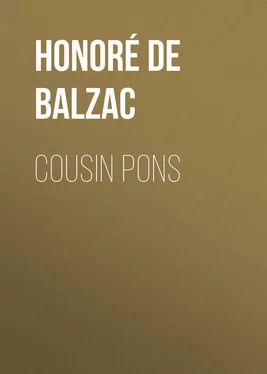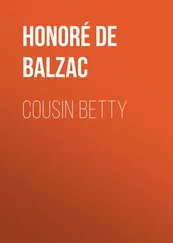Honoré Balzac - Cousin Pons
Здесь есть возможность читать онлайн «Honoré Balzac - Cousin Pons» — ознакомительный отрывок электронной книги совершенно бесплатно, а после прочтения отрывка купить полную версию. В некоторых случаях можно слушать аудио, скачать через торрент в формате fb2 и присутствует краткое содержание. Жанр: literature_19, foreign_antique, foreign_prose, на английском языке. Описание произведения, (предисловие) а так же отзывы посетителей доступны на портале библиотеки ЛибКат.
- Название:Cousin Pons
- Автор:
- Жанр:
- Год:неизвестен
- ISBN:нет данных
- Рейтинг книги:3 / 5. Голосов: 1
-
Избранное:Добавить в избранное
- Отзывы:
-
Ваша оценка:
- 60
- 1
- 2
- 3
- 4
- 5
Cousin Pons: краткое содержание, описание и аннотация
Предлагаем к чтению аннотацию, описание, краткое содержание или предисловие (зависит от того, что написал сам автор книги «Cousin Pons»). Если вы не нашли необходимую информацию о книге — напишите в комментариях, мы постараемся отыскать её.
Cousin Pons — читать онлайн ознакомительный отрывок
Ниже представлен текст книги, разбитый по страницам. Система сохранения места последней прочитанной страницы, позволяет с удобством читать онлайн бесплатно книгу «Cousin Pons», без необходимости каждый раз заново искать на чём Вы остановились. Поставьте закладку, и сможете в любой момент перейти на страницу, на которой закончили чтение.
Интервал:
Закладка:
With Pons’ decline and fall as an artist came his simultaneous transformation from invited guest to parasite and hanger-on; he could not bring himself to quit dinners so excellently served for the Spartan broth of a two-franc ordinary. Alas! alas! a shudder ran through him at the mere thought of the great sacrifices which independence required him to make. He felt that he was capable of sinking to even lower depths for the sake of good living, if there were no other way of enjoying the first and best of everything, of guzzling (vulgar but expressive word) nice little dishes carefully prepared. Pons lived like a bird, pilfering his meal, flying away when he had taken his fill, singing a few notes by way of return; he took a certain pleasure in the thought that he lived at the expense of society, which asked of him – what but the trifling toll of grimaces? Like all confirmed bachelors, who hold their lodgings in horror, and live as much as possible in other people’s houses, Pons was accustomed to the formulas and facial contortions which do duty for feeling in the world; he used compliments as small change; and as far as others were concerned, he was satisfied with the labels they bore, and never plunged a too-curious hand into the sack.
This not intolerable phase lasted for another ten years. Such years! Pons’ life was closing with a rainy autumn. All through those years he contrived to dine without expense by making himself necessary in the houses which he frequented. He took the first step in the downward path by undertaking a host of small commissions; many and many a time Pons ran on errands instead of the porter or the servant; many a purchase he made for his entertainers. He became a kind of harmless, well-meaning spy, sent by one family into another; but he gained no credit with those for whom he trudged about, and so often sacrificed self-respect.
“Pons is a bachelor,” said they; “he is at a loss to know what to do with his time; he is only too glad to trot about for us. – What else would he do?”
Very soon the cold which old age spreads about itself began to set in; the communicable cold which sensibly lowers the social temperature, especially if the old man is ugly and poor. Old and ugly and poor – is not this to be thrice old? Pons’ winter had begun, the winter which brings the reddened nose, and frost-nipped cheeks, and the numbed fingers, numb in how many ways!
Invitations very seldom came for Pons now. So far from seeking the society of the parasite, every family accepted him much as they accepted the taxes; they valued nothing that Pons could do for them; real services from Pons counted for nought. The family circles in which the worthy artist revolved had no respect for art or letters; they went down on their knees to practical results; they valued nothing but the fortune or social position acquired since the year 1830. The bourgeoisie is afraid of intellect and genius, but Pons’ spirit and manner were not haughty enough to overawe his relations, and naturally he had come at last to be accounted less than nothing with them, though he was not altogether despised.
He had suffered acutely among them, but, like all timid creatures, he kept silence as to his pain; and so by degrees schooled himself to hide his feelings, and learned to take sanctuary in his inmost self. Many superficial persons interpret this conduct by the short word “selfishness;” and, indeed, the resemblance between the egoist and the solitary human creature is strong enough to seem to justify the harsher verdict; and this is especially true in Paris, where nobody observes others closely, where all things pass swift as waves, and last as little as a Ministry.
So Cousin Pons was accused of selfishness (behind his back); and if the world accuses any one, it usually finds him guilty and condemns him into the bargain. Pons bowed to the decision. Do any of us know how such a timid creature is cast down by an unjust judgment? Who will ever paint all that the timid suffer? This state of things, now growing daily worse, explains the sad expression on the poor old musician’s face; he lived by capitulations of which he was ashamed. Every time we sin against self-respect at the bidding of the ruling passion, we rivet its hold upon us; the more that passion requires of us, the stronger it grows, every sacrifice increasing, as it were, the value of a satisfaction for which so much has been given up, till the negative sum-total of renouncements looms very large in a man’s imagination. Pons, for instance, after enduring the insolently patronizing looks of some bourgeois, incased in buckram of stupidity, sipped his glass of port or finished his quail with breadcrumbs, and relished something of the savor of revenge, besides. “It is not too dear at the price!” he said to himself.
After all, in the eyes of the moralist, there were extenuating circumstances in Pons’ case. Man only lives, in fact, by some personal satisfaction. The passionless, perfectly righteous man is not human; he is a monster, an angel wanting wings. The angel of Christian mythology has nothing but a head. On earth, the righteous person is the sufficiently tiresome Grandison, for whom the very Venus of the Crosswords is sexless.
Setting aside one or two commonplace adventures in Italy, in which probably the climate accounted for his success, no woman had ever smiled upon Pons. Plenty of men are doomed to this fate. Pons was an abnormal birth; the child of parents well stricken in years, he bore the stigma of his untimely genesis; his cadaverous complexion might have been contracted in the flask of spirit-of-wine in which science preserves some extraordinary foetus. Artist though he was, with his tender, dreamy, sensitive soul, he was forced to accept the character which belonged to his face; it was hopeless to think of love, and he remained a bachelor, not so much of choice as of necessity. Then Gluttony, the sin of the continent monk, beckoned to Pons; he rushed upon temptation, as he had thrown his whole soul into the adoration of art and the cult of music. Good cheer and bric-a-brac gave him the small change for the love which could spend itself in no other way. As for music, it was his profession, and where will you find the man who is in love with his means of earning a livelihood? For it is with a profession as with marriage: in the long length you are sensible of nothing but the drawbacks.
Brillat-Savarin has deliberately set himself to justify the gastronome, but perhaps even he has not dwelt sufficiently on the reality of the pleasures of the table. The demands of digestion upon the human economy produce an internal wrestling-bout of human forces which rivals the highest degree of amorous pleasure. The gastronome is conscious of an expenditure of vital power, an expenditure so vast that the brain is atrophied (as it were), that a second brain, located in the diaphragm, may come into play, and the suspension of all the faculties is in itself a kind of intoxication. A boa constrictor gorged with an ox is so stupid with excess that the creature is easily killed. What man, on the wrong side of forty, is rash enough to work after dinner? And remark in the same connection, that all great men have been moderate eaters. The exhilarating effect of the wing of a chicken upon invalids recovering from serious illness, and long confined to a stinted and carefully chosen diet, has been frequently remarked. The sober Pons, whose whole enjoyment was concentrated in the exercise of his digestive organs, was in the position of chronic convalescence; he looked to his dinner to give him the utmost degree of pleasurable sensation, and hitherto he had procured such sensations daily. Who dares to bid farewell to old habit? Many a man on the brink of suicide has been plucked back on the threshold of death by the thought of the cafe where he plays his nightly game of dominoes.
Читать дальшеИнтервал:
Закладка:
Похожие книги на «Cousin Pons»
Представляем Вашему вниманию похожие книги на «Cousin Pons» списком для выбора. Мы отобрали схожую по названию и смыслу литературу в надежде предоставить читателям больше вариантов отыскать новые, интересные, ещё непрочитанные произведения.
Обсуждение, отзывы о книге «Cousin Pons» и просто собственные мнения читателей. Оставьте ваши комментарии, напишите, что Вы думаете о произведении, его смысле или главных героях. Укажите что конкретно понравилось, а что нет, и почему Вы так считаете.












